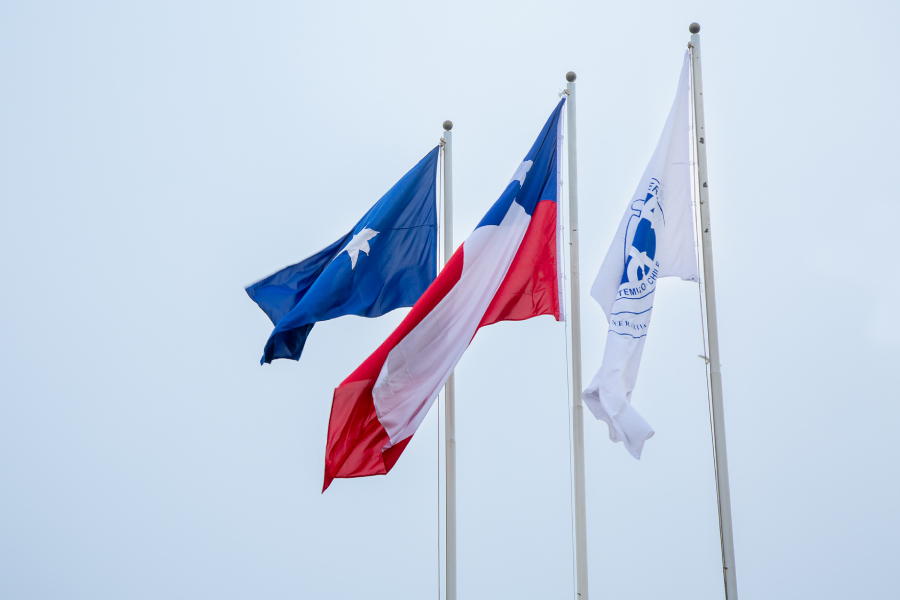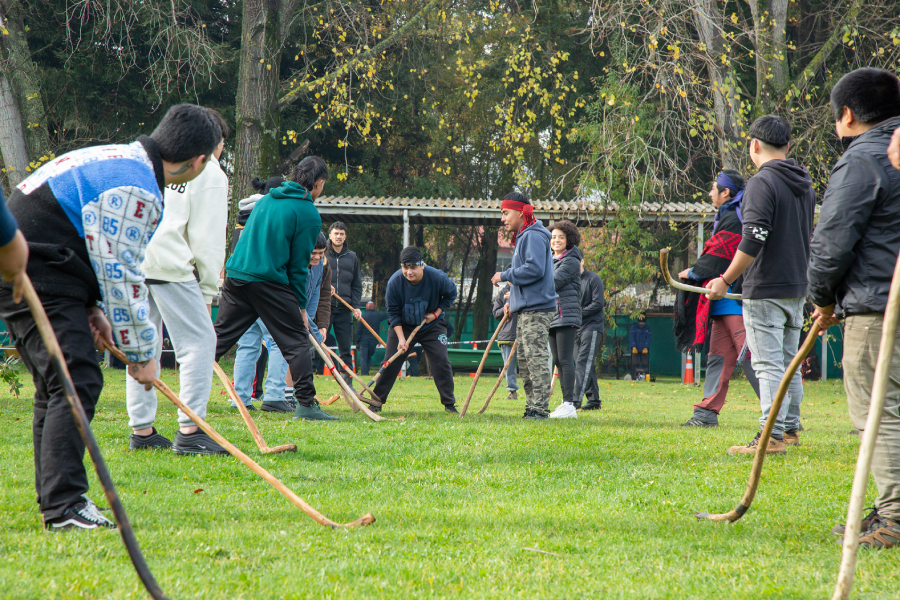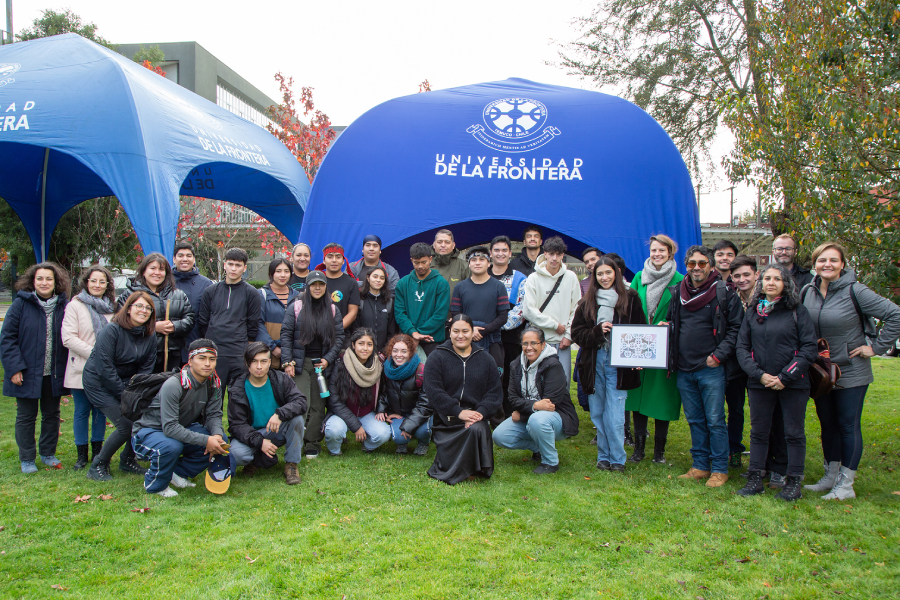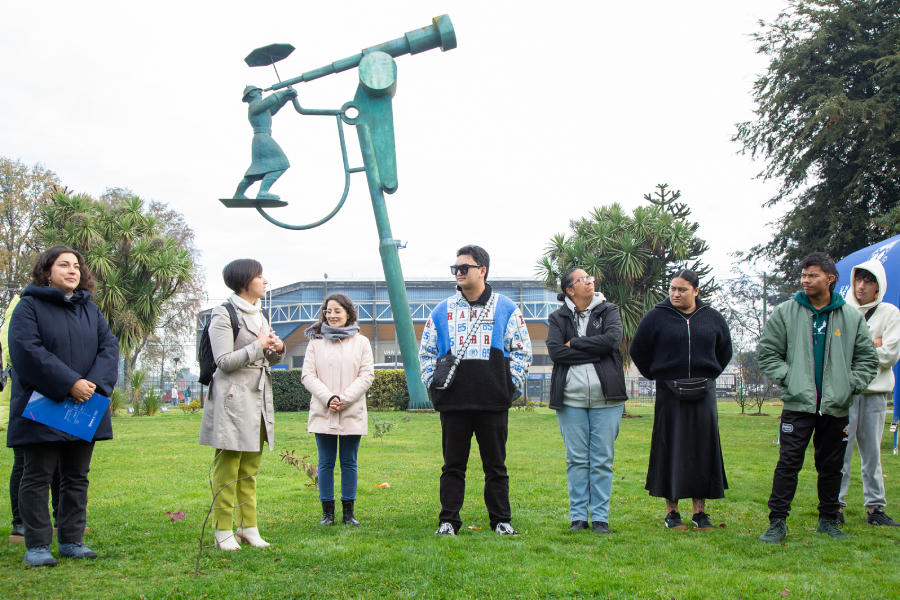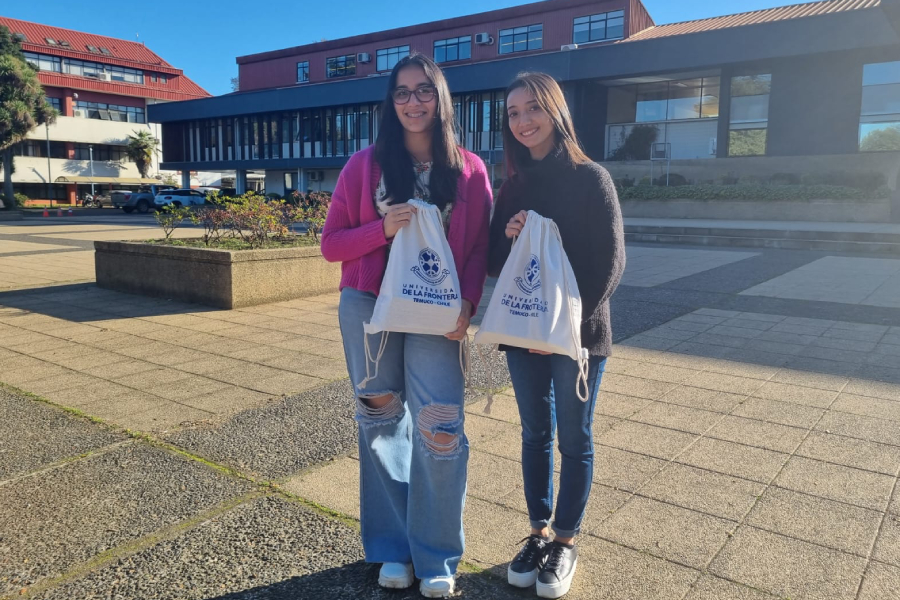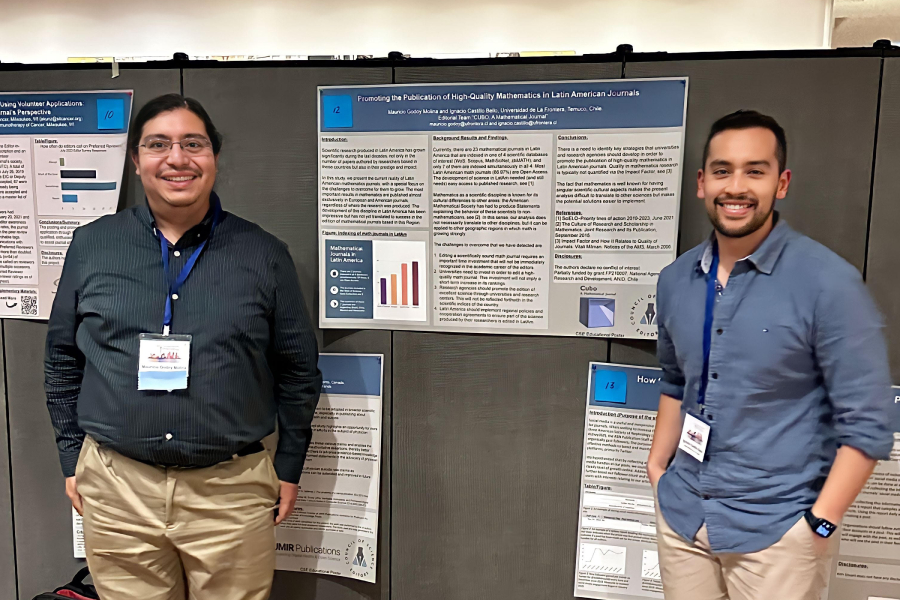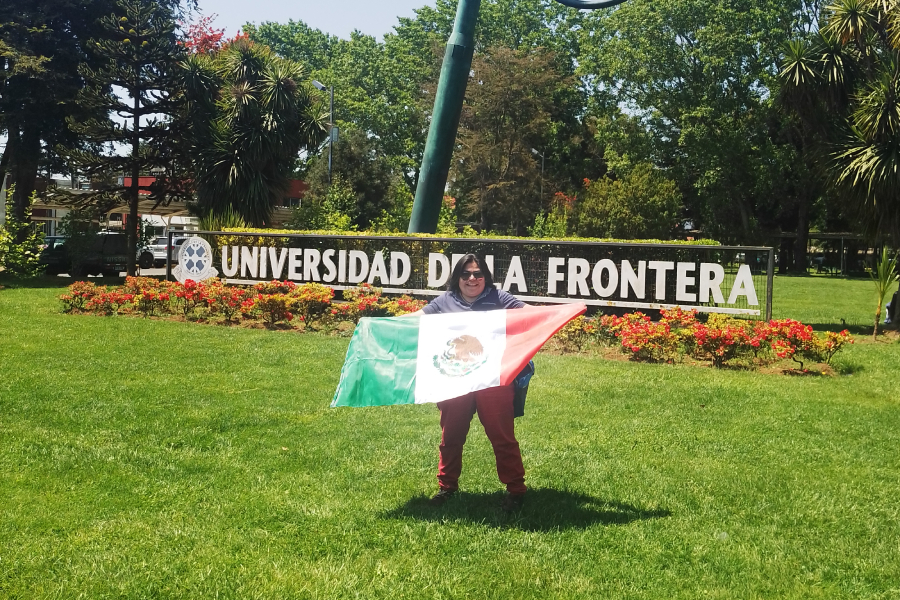|
From June 1 until June 27, Universidad de La Frontera celebrates the beginning of the new cycle and the return of the sun, which is known as “Wiñoy Txipantü” in the culture of the Mapuche people. |
With traditional Mapuche ceremonies, games, food, music and an oral competition, Universidad de La Frontera (UFRO) started the celebration of the beginning of the new cycle and the return of the sun, which is known as “Wiñoy Txipantü” in the Mapuche culture. The celebrations started on June 1, by raising the Mapuche flag on all of UFROs university campuses, which is called “Wüñelfe” or “Wenüfoye” in Mapudungun, the Mapuche language, and will last until June 27. The official programme for the celebrations was put together by a special committee, which is made up by different units of the university. “Our committee agreed on incorporating certain traditional symbols in the programme, such as the official flag of the Mapuche people, which was raised on all of UFROs campuses to give start to the celebrations,” said Osvaldo Curaqueo, the director of the Institute of Indigenous and Intercultural Studies. “The celebration and elaboration of this programme is another effort of the university to strengthen the intercultural relations both within the university, as well as within our regional context,” he added. Last Friday, the main activity took place on the official ceremonial space of the Mapuche people, the “Paliwe”, on the Andrés Bello Campus of UFRO, where the whole university community was invited to get together for a “Mizagun”, to try the traditional food of the Mapuche people and to immerse in the Mapuche culture. “We want to invite everyone of our university community to join the activities that are part of the official Wiñoy Txipantü programme, not only to celebrate, but also to get together to learn more about our ancestral culture and traditions. As a university community, we need to offer and promote more opportunities like this, since these activities also strengthen our efforts,” explained the director of the Institute of Indigenous and Intercultural Studies. Written and translated by: UFRO Communications Office
|
|
The agenda promoted the dialogue and partnership between young students of the Māori culture and the Mapuche culture, with traditional rituals and games, a visit to the ‘Interactive Ruca’ of the Rural School Raluncoyan, and to the Pucon Campus of UFRO. |
Within the framework of the Nga Herenga Whakapapa (NHW) programme of the Embassy of New Zealand, a delegation of students and teachers of the Māori culture from New Zealand visited Universidad de La Frontera (UFRO) in Chile. The Embassy and UFROs International Affairs Office developed the agenda for the intercultural meetings, which are an important step forward regarding the Internationalisation Strategy of UFRO and Global Citizenship, which is an important pillar of the Educative Model of UFRO. Thanks to the programme and the collaborative work, these young indigenous peoples were able to share experiences and to get to know the current local reality. The director of the International Affairs Office, Paulina Latorre Bahamondez, explained: “These meetings are important for our international relationships. They allow us to connect with other cultures, other people and to get to know other knowledge. In addition, these initiatives are a concrete example of what we want to achieve as a university”. The Embassy of New Zealand and the International Affairs Office of UFRO put together a comprehensive work agenda, which included a ‘Mizawun’ (a space for knowledge exchange and conversation) at the Institute for Indigenous and Intercultural Studies of UFRO, with participation of UFRO students who are part of the RUPU Programme, which supports students of the Mapuche culture to settle into the university environment. According to the director of the Institute for Indigenous and Intercultural Studies, Osvaldo Curaqueo Pichihueche, the meeting took place “in a ceremonial environment, with individuals of each indigenous peoples, as a great moment to promote respect for and the importance of each ones identity”. “This initiative allows us to recognize and value our identities and knowledge, and to interact and share on the basis of the activities and protocols that are characteristic for each of these indigenous cultures,” he added. ACTIVE DIALOGUE BETWEEN CULTURES The Māori delegation and students of UFROs RUPU programme visited the Rural School Raluncoyan, where they had an interesting encounter with children of the community and the sector. Teachers and employees of the Municipal Department of Education in Temuco participated in this activity, together with their director, Marcelo Segura. PUCON CAMPUS The next day, the delegation visited UFROs Pucon Campus, where they held a ‘Llellipún’, which is a welcome ceremony in the Mapuche culture. In addition, they visited the Interactive Volcanological Centre of the La Araucanía Region and the Intercultural Village ‘Trawupeyüm’ in the city of Curarrehue. “The idea of these activities is to create and promote a cultural exchange, taking into account that this programme and the visit of the Māori delegation focus on getting to know the life of the indigenous peoples,” explained Janina Hanswillemenke, the organizer of these activities and the coordinator of internationalisation at UFRO. NGA HERENGA WHAKAPAPA Nga Herenga Whakapapa consists of young Māori students and entrepreneurs who want to be in contact with young indigenous students with similar ideas in the Chilean cities Santiago and Temuco. Nga Herenga Whakapapa describes the “binding of many family connections”, which is the basis for a significant relationship with their Chilean peers. In addition, this initiative gives the young Māori leaders the opportunity to have an intercultural exchange and global interaction, which they can apply in their future projects. Written and translated by: UFRO Communications Office
|
|
Thanks to the MITACS-Canada programme and its agreement with the universities of CRUCH, Catalina Valdebenito Gallardo and Martina Campos Torres are able to spend 12 weeks as research assistants for different research projects at Canadian universities, under the supervision of outstanding researchers. |
With great joy, Universidad de La Frontera (UFRO) received the great news that two of the seven scholarships of the MITACS Globalink Research Internship (GRI) programme in Canada go to the UFRO undergraduate students Catalina Valdebenito Gallardo of the Law programme and Martina Campos Torres of the programme in Pedagogy in History, Geography and Civic Education. This scholarship gives them the opportunity to spend 12 weeks (between May and October) as research assistants at Canadian universities. Catalina Valdebenito Gallardo, a student of the Law programme of UFRO, will use this scholarship to collaborate in the project “Embracing Indigenous Rights via the UN Declaration on the Rights of Indigenous People, AMDRIP and International Trade Agreements” of the academic Bradford Morse, at Thompson Rivers University in Kamloops (British Columbia). “I will investigate the progress of the rights of indigenous people in each country and the compliance with the corresponding treaties. It is a great challenge, since this will be the continuation of a project which the same professor started with another exchange student last year,” she explained. At the same time, Martina Campos Torres of the Pedagogy in History, Geography and Civic Education programme of UFRO will work together with the academic Janet Okoko of University of Saskatchewan in Saskatoon (Saskatchewan) on the project “Strengthening Instructional Leadership Capacity for Practitioner-Oriented and Technology-Mediated Educational Research to Support Student Learning”. The students commented that they are very grateful for all the support they received in this process by the university and especially by those who are part of their study programmes. “My professors and the director of the programme were really helpful, so I was able to finish the semester earlier, in order to start my stay without worries. I wanted to apply for this scholarship, because it is rather uncommon to find one that is dedicated to research, which is my field of interest for my future graduate studies. I wanted to take this opportunity to learn how to do research, since we learn about it in theory, but I think that it will be quite different to apply this knowledge in practice”, Martina Campos said. For Claudia Villagrán, the person in charge of outgoing mobility at the International Affairs Office, this opportunity is very important for the whole university community of UFRO, since it directly contributes to UFROs internationalisation process. In this context, she pointed out: “We want to support our students in the process of application for existing scholarships, funding and mobility programmes, because we are convinced that, especially in this case, it is a tremendous opportunity for both of them. They both received a lot of support by the university and especially by their programme directors, who fully supported them in this process previous to their stays”. It is also worth mentioning that the scholarship of the Globalink Research Internship programme is worth about 12,000 Canadian Dollars and financed by MITACS and the universities of the Council of Rectors of Chilean Universities (CRUCH). It provides real opportunities of growth regarding research and innovation, and allows students to spend three months supporting scientific research in the fields of science, engineering, mathematics, humanities and social sciences.
Written and translated by: UFRO Communications Office
|
|
This year, the traditional annual meeting took place in Toronto, Canada, and the journal “CUBO, A Mathematical Journal” of UFRO participated for the first time, with the managing editor Dr. Mauricio Godoy Molina, and Ignacio Castillo Bello, who is in charge of editorial production. |
It was the first time that part of the team of the journal “CUBO, A Mathematical Journal” of Universidad de La Frontera (UFRO) participated in the Council of Science Editors (CSE) Annual Meeting, which took place in Toronto, Canada, this year. Each year, editors-in-chief, associate and executive editors, analysts and editorial assistants of well-known scientific journals from different parts of the world come together at this meeting to address the current state of scientific publishing and the specific challenges of this important task, in order to promote a responsible and effective dissemination of science. The representatives of UFRO in this meeting were the managing editor Dr. Mauricio Godoy Molina, and Ignacio Castillo Bello, who is in charge of editorial production. They both participated within the project FP210007 “Optimisation of the editorial process and improvement of the international visibility of the journals CUBO, A Mathematical Journal and Perspectivas de la Comunicación”, financed by the Chilean National Agency for Research and Development (ANID). “Some of the objectives that motivated us to participate in this meeting were to share experiences with professional editors from some of the world’s most prestigious scientific journals in different fields of knowledge, and to contextualise the work of the CUBO team with respect to the latest trends and standards established and developed by the world’s leading scientific editorial teams,” Dr. Godoy explained. As part of their participation, they also presented a poster with a preliminary analysis of the positioning of publications of original mathematical research in journals based in Latin America, with special emphasis on quality standards and international indexation. It is worth mentioning that the mathematical journal CUBO is part of the prestigious Web of Science (WoS) since 2022 and of the international database Scopus since 2020, two milestones that reflect the important development of this journal of UFRO. According to the editors of CUBO and their presentation at the meeting, this journal is one of only seven Latin American mathematical journals that meets all international quality requirements for these databases. “In addition, we had a collaborative and strategic work meeting with Javad Mashreghi, a full professor at Université Laval in Quebec, Canada, editor-in-chief of the Canadian Mathematical Bulletin and former president of the Canadian Mathematical Society,” added Dr. Mauricio Godoy, confirming that this outstanding researcher will also be part of the international editorial team of the journal CUBO. “This collaborative work will definitely be crucial to position our journal even more in the field of mathematics at the international level.” The engineer Ignacio Castillo was equally enthusiastic about their participation, the new knowledge acquired and the new contacts. “This meeting, which brings together editors and publishers from different fields of science, motivates us to further strengthen our journal, and to give it greater visibility. The exchange of experiences was very enriching and helps us to make our work even more professional.” In this context, the journal makes significant continuous progress in its international consolidation, an effort that started in 1985 and has developed over the years, thanks to the work of a team of passionate mathematicians of the Department of Mathematics and Statistics of the Faculty of Engineering and Science at Universidad de La Frontera. Written by: Daphne Bormann Parada |
|
Karla Ávila Merino carried out her Master’s studies at Autonomous University of Puebla in Mexico and came to Chile to study three subjects of the Master of Business Administration at Universidad de La Frontera. |
One of the objectives of Universidad de La Frontera (UFRO) is to promote the undergraduate and graduate mobility, being convinced that national and international student mobility opens great learning opportunities and personal growth. In this context, Karla Ávila Merino carried out her Master’s studies at Autonomous University of Puebla (BUAP) in Mexico, what allowed her to come to Chile for three months and to take three subjects of the Master of Business Administration (MBA) of the Faculty of Law and Business at UFRO, thanks to a mobility and cooperation agreement between both universities. For the welcome ceremony for the new graduate students 2023, the Master of Business Administration asked the Mexican student Karla Ávila to share her impressions about her stay in Chile and the training process at UFRO. MOBILITY AT UFRO The idea of carrying out her Master’s studies in Chile started about ten years ago. “I tried more than three times to go, but without success. However, after finishing my studies at BUAP in Mexico, I finally had the chance to go to Chile and to take three subjects at Universidad de La Frontera,” she explained. Karla pointed out that, among the possible universities for her mobility, UFRO was the only one that met all the requirements, which is why she chose to come to UFRO. According to Karla, the choice of the university consisted of a comprehensive search, in which she tried to find a program with similar standards to her study programme at BUAP in Mexico. Therefore, she made the corresponding consultations and compared different options, among which UFRO was the one that met all her requirements, since it had the corresponding mobility agreement, the Master’s programme and similar bases. “My stay at UFRO allowed me to broaden my horizons and to make new experiences. I would definitely recommend others to make use of mobility opportunities at UFRO, in order to live such a great experience in the beautiful La Araucanía Region,” she said.
Written by: Carlos Sáez Figueroa |





